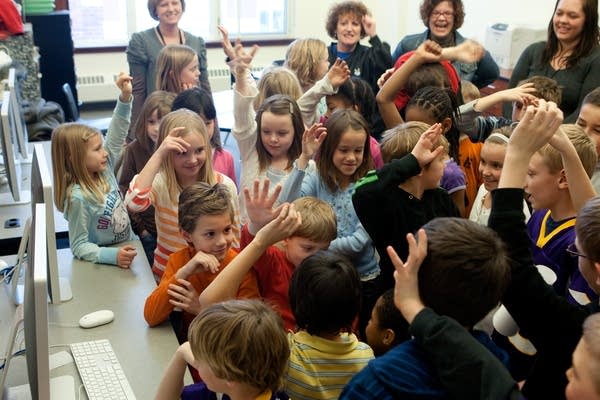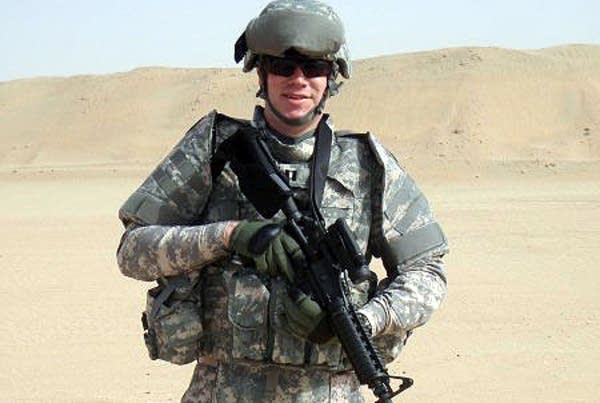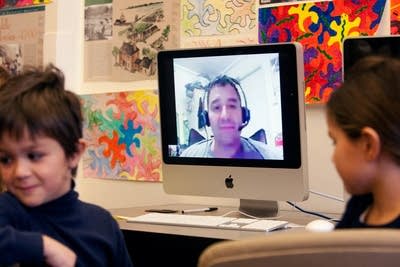War 2.0
Go Deeper.
Create an account or log in to save stories.
Like this?
Thanks for liking this story! We have added it to a list of your favorite stories.

Laurie Kimball stood in her usual spot at the kitchen counter in front of her laptop. Her screen was open to Facebook, where her daughter Melissa Kimball posted pictures of her quarters in Basra, Iraq.
Melissa, 19, is on her first deployment with the Minnesota National Guard. Her mother explained how they keep in touch.
"Facebook. And then she's got Gmail e-mail, so a couple of times we've been able to chat on Gmail, and I said post to Facebook because it goes right to my phone," Kimball said. "So Friday at 4:01 a.m. she posted, 'Mom, I'm up. Can you Skype right now?'"
Long-distance electronic communications keep the Kimballs as close as technology can, but it doesn't compare to the real thing. Just after the holidays, Melissa came back to Blaine for a two-week leave, she described the dual reality of Internet communication.
Turn Up Your Support
MPR News helps you turn down the noise and build shared understanding. Turn up your support for this public resource and keep trusted journalism accessible to all.
"I'd rather know that even though I'm not here, they are still thinking about me. And I do like seeing pictures of my niece and knowing, to a certain extent, what is going on, you know - how people are doing," Melissa said. "But I don't necessarily need to know about all the good stuff that is going on."
For the first time in history, laptops are common in the war zone. Instant communication technology helps families keep in touch with deployed soldiers, but it also means navigating a minefield of decisions about how much information to share.

The Internet offers a whole new world of ways to communicate today, but the old rule still applies -- loose lips sink ships.
Service members are allowed to communicate with loved ones back home however they want. Military bases offer free computers with Internet, and soldiers can pay extra for private Internet access in their bunks.
But there are limits. The military trains service members and their families how to communicate without giving away details that could put people in danger. Service members risk punishment if they reveal too much. And blog or Facebook posts can be shut down -- although officials said that doesn't happen often.
Instant communication also has a flip side. Service members can be at risk when their attention is divided between the military mission and what they are missing at home. And families get used to talking a lot, so when their loved one can't call home, they say they fear the worst.
That worry intensifies when there is an attack or a death in a unit. When that happens, there is a communication blackout which can last hours or days.

FROM WAR ZONE TO CLASSROOM
At Hassan Elementary School in Rogers, Minn., a group of students waited their turn to talk with National Guard Cpt. Jim Pereda -- who is in Iraq -- on a Web camera.
Pereda's three school-aged children invited their classmates to chat with their father using Skype, a free service that lets you call, video chat and send instant messages over the Internet.
Pereda greeted the kids as they took their seats in front of the computer. The image of his face was shaky at times, and there was a few second delay, but the communication was virtually instant.
The kids took turns asking a long list of questions they prepared in advance. Charlie Pereda's third grade class went first.
They asked Jim Pereda the temperature and time in Iraq, whether he celebrated Christmas and what he does for fun. The kids laughed when Pereda told them he was wearing his pajamas.
Before he left for Iraq, Pereda visited the school in person, and brought in his uniform and equipment for show and tell.
Some of the kids remembered that visit, especially his smelly helmet. They loved it when Pereda told them he has a new, un-smelly helmet now. They made plans for another visit when he got home.
After about an hour of questions with his kids' three classes, it's time to say goodbye.
"I love you guys," Jim said.
"Bye Daddy. Bye, Dada!"
It's not clear exactly how many military families keep in touch over the Internet. But lots of them are doing it.
In between Skype sessions, Jim said more than half the soldiers in his unit talk to their families using web cams.

He said communicating this way is a lot easier for his young kids to understand than a regular phone conversation.
"Talking to the kids at home on Skype is really great. I think it engages their interest a little more sometimes than just talking on the phone," Jim said.
Peggy Pereda said video chatting has been important for the whole family, especially the children.
"I can't imagine them not seeing him for a year, and for him as well, especially with my younger one who is just almost four. Obviously, they change so much in a year," Peggy said.
Peggy said the web camera even made it possible to include her husband in Christmas celebrations at home.
"When we did Christmas with his family, I just set it (the web cam) on the side table and he watched the kids open all their Christmas presents," said Peggy said. "It kind of made him feel like he was there, a little bit, which was really nice, and the kids came over and showed him each present they opened and stuff like that"
Jim's deployment is almost up. He is expected back in Minnesota sometime this month.
IS KEEPING IN TOUCH TAKING A TOLL ON SOLDIERS?
The days of waiting weeks or months for news about a loved one fighting overseas are clearly behind us. But what isn't clear is how all this instant communication may be affecting service members on deployment.
Few would argue keeping in touch is a bad thing, but there is evidence that worrying about problems back at home while in combat can be bad for a service member's health.

University of Minnesota psychologist Michael Miller said stress induced by worry over problems at home makes people more susceptible to mental health problems.
"You look at a lot of soldiers who struggle in country and frequently there are specific or significant events that are happening in their personal life that they don't have any control over and that frequently leads to making them more susceptible to post-traumatic-stress disorder (PTSD)," Miller said.
Miller counsels people with PTSD and served 22 years in the military, where he helped train commanders and soldiers on how to manage combat stress.
He said any added stress -- whether it's about family, finances or anything else, makes service members more susceptible to mental and physical health problems down the road.
TALKING BUT NOT SHARING EVERYTHING

Jamie Schmitz and her husband Cpt. Benjamin Schmitz, who is serving in Iraq, said they set limits on which topics to discuss to reduce worries.
On her lunch hour in the St. Paul skyway, Jamie explained that they talk almost every day over email, cell phone and web cam but she tries not to involve him in problems until they are resolved.
"Like any major catastrophe at the house - I can tell him about it after I have it handled but beforehand I don't want him to have to worry about that kind of stuff," Jamie said. "They don't need to hear those problems."
Nothing major has broken down at the house since her husband deployed, but their son Harrison was sick a lot. Eventually, he had surgery to remove his tonsils and adenoids and to insert ear tubes.
Jamie's mom helped take care of her son but Jamie said it was still tough to go through that without her husband.
"That recovery period was probably the worst two weeks of my life. It was very painful for Harrison, and he wouldn't take his medicine so I censored it some," Jamie said. "He knew that the surgery was happening. I couldn't not tell him that. But I kind of censored how bad those two weeks were while he was recovering. It wasn't fun."
Jamie said she suspects her husband censors himself to keep her from worrying too much about his safety. She can't wait until he's home so they can both relax
Dear reader,
Political debates with family or friends can get heated. But what if there was a way to handle them better?
You can learn how to have civil political conversations with our new e-book!
Download our free e-book, Talking Sense: Have Hard Political Conversations, Better, and learn how to talk without the tension.







